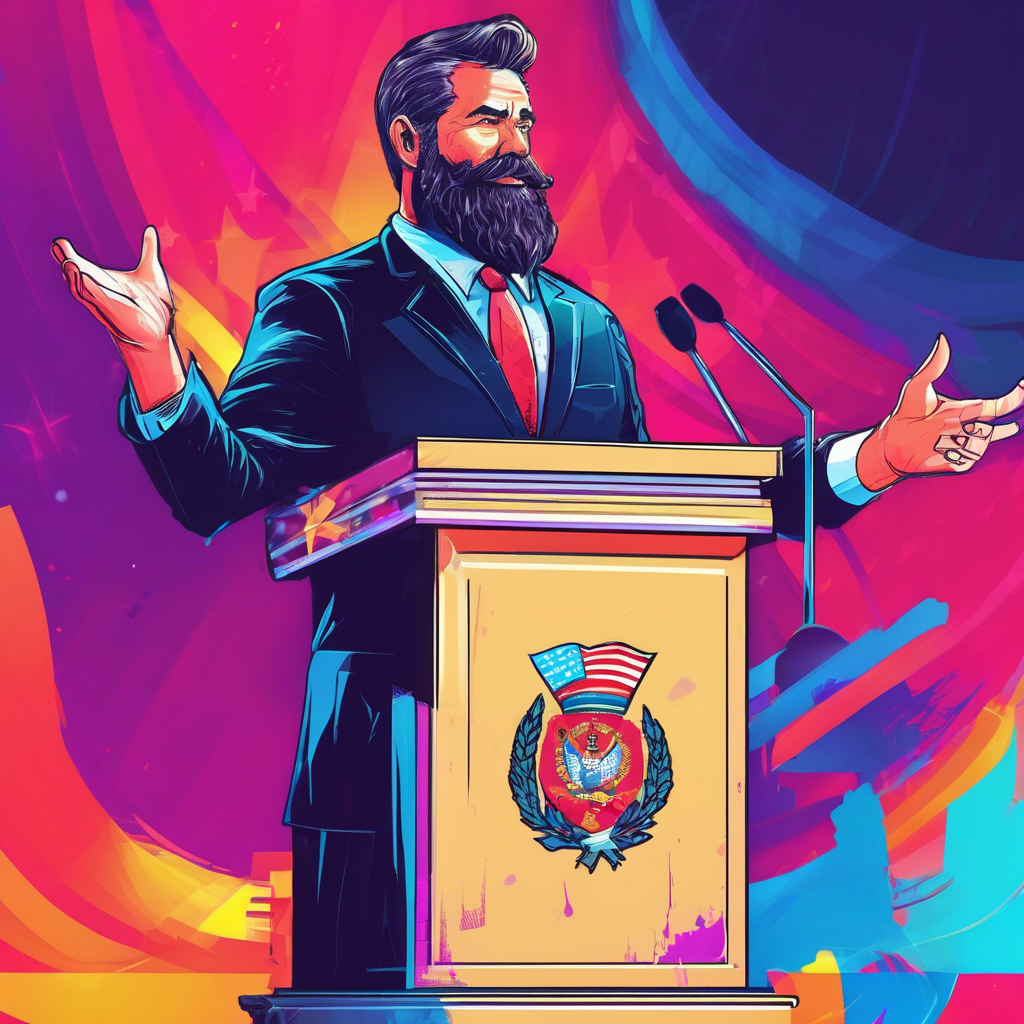I value straightforwardness over performative politeness. This can, and has, got me into trouble at times. Speaking your mind openly and honestly has for a long time felt like a social taboo. For a public figure to break that social taboo and speak without the sanitised, empty, double speak normally found in the political class, is a breath of fresh air. It is a departure from the cautious tiptoeing around sensitive topics. Honesty and authenticity. Opinion, unfiltered.
In a time when empathy is prized above all, those who value raw honesty are finding a voice.
Face The Nation
Many see the current political and social landscape as overly feminised and our discourse sugarcoated with niceties and platitudes. This leaves us unable to tackle the problems at hand for fear of offending someone, being mis-labelled by those who disagree, branded as uncaring or unempathetic to the plight of others less fortunate. JD Vance’s interview with Margaret Brennan on Face The Nation might end up being far more significant than he anticipated. When being probed on issues of immigration and vetting, JD Vance pushed back on Margaret’s claim that it was unclear if an immigrant had been radicalised before or after he had arrived in the country.
“I don’t really care, Margaret. I don’t want that person in my country, and I think most Americans agree with me.“
This simple, unfiltered statement left many vocal critics spluttering in righteous indignation. Then Vice President Kamala Harris called it “heartless” and “dangerous,” stating, “We cannot afford to turn our backs on those fleeing persecution. Vance’s words are a step backward for our values,”. CNN anchor Jake Tapper remarked that the statement was “lacking the empathy and depth needed for serious policy discussions,”. Even the UK’s David Milliband, the former Secretary of State, waded into the argument stating that JD “ignores the rigorous vetting already in place and dismisses the humanity of those seeking safety.”
Collectively, the response of the politically left, argued that Vance’s blunt dismissal overlooked the complexities of refugee vetting and showed an absence of empathy toward vulnerable populations. But I believe that JD Vance just said what a lot of us, myself included, are thinking. The empathy card has been played for too long and too hard, our charity has and is being taken advantage of, and the cost of this is a low trust society, insecurity and a massive reduction in the standards of living for many. The trade offs are no longer worth it.
It’s nice to be nice, but how has empathies role helped or hindered us navigate history?
The Feminised Tilt
Empathy involves understanding and sharing others’ emotions. It is often split into two categories. Cognitive Empathy, understanding someone else’s’ feelings, and Affective Empathy, actually feeling what another person feels. It is not by any means the sole preserve of women, it varies by culture, personality, and upbringing. A meta-analysis by Eisenberg and Lennon (1983) showed that when self reporting, women consistently report higher levels of empathy, versus men within the same studies. It must be noted that this doesn’t mean they are more empathetic, only that they perhaps feel more social pressure to say they’re empathetic, a component of social desirability.
A study by Michalska et al. (2013) used brain imaging and found that women showed stronger empathetic responses, like increased activity in certain brain areas, when observing others in pain. A separate study in 2022 found that men and women use different parts of the brain when dealing with empathy and compassion, but not necessarily with different outcomes. Only that men and women parse the world differently. Men largely make compassionate judgments based on contextual information, while women tend to notably take internal and introspective processes into account.
“The modern world suffers from an excess of tenderness, where every opinion must be swaddled in soft words lest it bruise.”
Friedrich Nietzsche, Thus Spoke Zarathustra (1883–1885)
If we pivot back to politics and todays Western society, we see that empathy dominates public expectations, and cultural norms push emotional sensitivity as a virtue. This feminised tilt has shaped entire political topics. Think of cancel culture, the softening of controversial opinions and policy. We cannot deny the upside: empathy fosters inclusion and support for the marginalised, but has this emphasis left us less equipped for hard, pragmatic choices, especially when survival (economic, cultural, or otherwise) is at stake?
As of January 3, 2025, there are 125 women in the U.S. House of Representatives, making women 28.7% of the total. Following the 2024 UK general election, 263 of the 650 seats in the House of Commons (40%) are held by female MPs. In the 10th legislature of the European parliament women will account for 38.75% of the MEPs. In all of these political spheres we see the same trends of suicidal empathy that rely on emotion as a weapon regardless of consequence, and where reality has been pushed out in favour of ideology.
Back To Our Roots
In early human social evolution, at the time of hunter gatherers, empathy was a survival tool. It glued groups together, smoothed internal conflicts and ensured that offspring thrived through attentive care. It was an important part of in-group cohesion. This was a time when survival wasn’t guaranteed, when an injury could deprive the group of a valuable hunter, or when squabbles could have ruined a functional unit that hunted for the benefit of the whole tribe.
For parents, empathy was critically important to the survival of infants. Decoding an infant’s cry as hunger or fear meant better care, raising the odds that the child would survive to hunt or gather one day. Anthropologists see this in modern analogs like the !Kung San, where communal support reflects empathy’s deep roots.
“Man is by nature a social animal; an individual who is unsocial naturally and not accidentally is either beneath our notice or more than human.”
Aristotle, Politics (c. 350 BCE)
Even biologically, it tracks: mirror neurons, those brain cells firing when we see others in pain, likely evolved to sync group emotions, making us feel a friend’s loss as our own. Think of mirror neurons as a neural bridge between observation and experience. When you watch someone wince after stubbing their toe, your mirror neurons activate as if you’re feeling that pain, or at least preparing to. They don’t just mimic actions; they’re tied to intentions and emotions too. Mirror neurons also likely gave a survival edge as well, learning by watching, group coordination and social bonding are all key to working as a group.
But empathy has its limits. In a famine, mourning every lost tribal member would sap the strength of the group. In an ambush, hesitating to attempt to save a wounded or sick brother might doom the rest of the group. Empathy might build the heart of a tribe, but in a situation that requires ruthlessness to ensure survival, another kind of human had to step in. Those less tethered by feeling, ready to face the unforgiving realities of life.
Ground Yourself In Realism Not Sentiment
Low empathy decision making is very much about group survival over sentiment. It is a pragmatic appraisal of the information available, in order to perform survival mathematics, regardless of how heartless or dispassionate some might view them. Sometimes, in hindsight, these actions are viewed favourably, sometimes not. If you look back through history, there are never solutions, only trade offs and compromises.
“The life of man is of no consequence when the existence of the state is at stake.”
Otto von Bismarck
In August 1776, General George Washington faced a dire moment in the American Revolution. British forces had landed 32,000 troops on Long Island, outnumbering Washington’s 19,000. Rather than fight to the last man, Washington made a steely call: abandon New York City and retreat. He didn’t pause to mourn the loss of the city, America’s commercial hub, or the civilians left under British rule. Nor did he indulge the morale of soldiers who might’ve wanted to stand and die heroically. His focus was singular: preserve the army.
After Pearl Harbor, Franklin Roosevelt signed Executive Order 9066, interning over 120,000 Japanese Americans. He didn’t dwell on their personal plight, many were loyal citizens, but acted on security fears, however exaggerated. Empathy took a backseat to a perceived need to protect American culture from sabotage risks. While flawed and later regretted, it reflected a wartime calculus to maintain national cohesion, not derangement.
As Singapore’s founding leader, Lee Kuan Yew, bulldozed kampongs, the traditional villages, to build high-rises and infrastructure. He didn’t linger on residents’ nostalgia or displacement; his focus was a modern, disciplined state to lift Singapore from poverty. Empathy for the old ways yielded to a vision of survival through efficiency.
You can argue the merits for and against each of these examples, my position is not to analyse the ethics, nor the morality of the actions, but to imagine what might have happened had they not taken those decisions. While empathy built the group, it wasn’t always the one steering it through the toughest calls.
Conclusion
Individuals with fierce pragmatism are not the glue that holds a tribe together. They are the ones called upon to make difficult choices. Today, we might balk at such hardness, steeped as we are in empathy’s glow. Given how abundant our lives are, it is no wonder that some think that we are able to be infinitely generous, but that abundance was only brought about by those who made very difficult choices.
You cannot look at the economic and social data from most Western nations and argue that we are trending in the correct direction. The continuation of policy that allows for mass immigration, rampant governmental spending in special interests (at home or overseas), in the face of statistics that indicates a path to financial collapse and cultural Balkanisation, would appear to be the madness of pathological empathy. Cultural suicide.
JD Vance, in his quick one liner, indicated that it is now socially acceptable to tackle the hard conversations, no matter how cold or polarising they may seem to some, or how distasteful the process may be.


